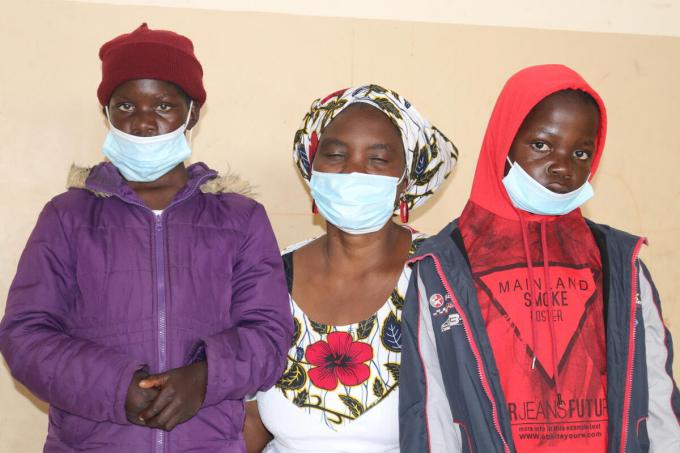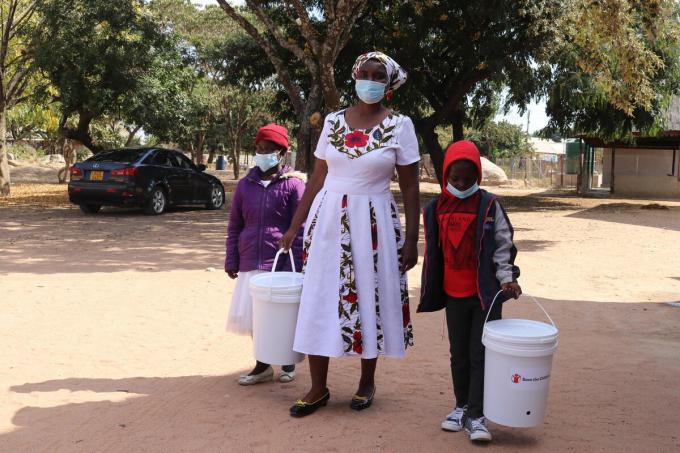The Impact of COVID-19 on Children and their Families
Elsa’s disability, combined with the pairs status as orphans, make Elvis and Elsa particularly vulnerable to the impact of COVID-19.
Elsa and Elvis stay with their aunt, Shingirai in Chitungwiza town. Their father passed away in 2019 during the Cyclone Idai emergency, while their mother abandoned them immediately after this sad incident. Elsa has an intellectual disability that led to her losing her speech. Despite being aged 10 years, Elsa’s young brother Elvis is still in grade 1, owing to being enrolled late in school.

To prevent the spread of COVID-19, Schools in Zimbabwe closed in March, before the end of the first school term. The siblings are worried they will forget what they have learnt as a result of the prolonged school closures in Zimbabwe. Elvis explained what he had heard about the Coronavirus.
“I am in grade 1. I am not going to school because there is Corona. It is in every country. Corona Kills. That is what I was told by my aunt. Coronavirus has killed people in Zimbabwe, South Africa, and Mozambique. We should wear face masks and not travel a lot so that we don’t get coronavirus. I should also wash my hands when I am about to eat.”
Elsa and Elvis’s aunt is worried they will forget what they have learnt as a result of the prolonged school closures in Zimbabwe.
“My niece Elsa has a mental challenge and this long break away from school will affect her comprehension. All the skills she had acquired at school would have been forgotten by the time schools reopen.”
“Elvis started school really late. Despite being 10 years old, he is in grade 1. When he started staying with me in January this year I decided to put him in grade 1 because I realised he had no learning background. I noticed that he was progressing well but unfortunately, that’s when schools closed due to Coronavirus.”
In a country that is already facing nationwide food, cash and fuel shortages, the COVID-19 outbreak has pushed more and more families to the brink. Elsa and Elvis’s aunt said her income and that of her husband was just too little to accommodate the whole family’s needs.
“I have four other children of my own and this makes me have a total of 6 children. I also take care of my 82 year- old father-in-law, who is bed ridden after suffering a stroke twice. So I can safely say I have a family of 9 people including my husband and I.”
“I am a teacher, while my husband is a pastor and our salary is very low. Life is very tough for us now. We have now resorted to eating around midday and then later in the evening. We skip breakfast because we just cannot afford it now. ”
“Some kids are having online lessons during this lockdown period but my children cannot participate because I cannot afford to buy data bundles, they are very expensive and we also don’t have laptops for them to use,”
“This is giving me sleepless nights. As a mother you simply get pained when you cannot do much for your children.”
Elvis and Elsa are among the 650 children who received hygiene kits to help them stay safe during the COVID-19 pandemic.The kits were distributed by Save the Children under the Education Cannot Wait project which is being implemented in Chitungwiza and Epworth towns.

Vulnerable children across 40 primary schools in the two towns were given hygiene kits which contain a bucket for use in hand washing, bars of soap, bath towels, disinfectant liquid and sanitary pads for girls. Under the same project, families are also receiving information about coronavirus, how to protect themselves from getting infected, Psychosocial Support, as well as guidance on how they can do home schooling.
 Zimbabwe
Zimbabwe